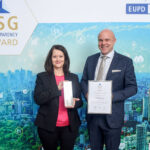For the first time, the SAM/SPG Sustainability Leadership Award, which acknowledges personal excellence in implementing the principles of sustainability in the corporate sector, has gone to a leader as well as to a pioneer. The jury has singled out Antony Burgmans, Chairman of Unilever N.V., as a leader who, during his years at the helm of the big multinational, has successfully championed sustainability. Robin Cornelius, the founder and CEO of Switcher, has been honoured as a pioneering entrepreneur. A total of 51 candidates were nominated for this years award, compared with 43 last year.
Antony Burgmans, the joint winner of the Fourth SAM/SPG Sustainability Leadership Award, is one of the two chairmen at the helm of the Anglo-Dutch food conglomerate Unilever. In this post he has not only steered the company through a radical transformation process, but also demonstrated how a company can contribute to a more sustainable quality of life around the globe. Unilevers main focus is on three areas: sustainable farming, water and fishing. By setting up pilot projects, Unilever has developed guidelines for more sustainable cultivation of the five most important agricultural products it uses as raw materials: tea, palm oil, spinach, tomatoes and peas. The purpose of these guidelines is to encourage the entire food industry to adopt more sustainable methods in order to assure the long-term productivity of farming systems.
Antony Burgmans is a committed member and chairman of the Marine Stewardship Council, a joint initiative set up by Unilever and the World Wildlife Fund (WWF). Founded in 1996, the purpose of the Marine Stewardship Council is to preserve marine resources and to campaign for their sustainable management. Mr Burgmans also chaired the CEO Panel of the World Water Forum in The Hague in 2000 and in Kyoto in 2003.
While Antony Burgmans has been honoured as chairman of a famous multinational for his commitment to sustainability as an industry leader, the name Robin Cornelius is associated with a success story in social and environmental commitment in the field of sports and leisure wear. Since founding Switcher SA in 1981, a manufacturing and trading company for sports and leisure wear, Robin Cornelius has shown enormous commitment to social and environmental principles. The Swiss textile manufacturer has made a stance against child labour, for example by ensuring that no one under the age of 16 is employed to sew garments in Tirupur, a textile centre in southern India. Working in association with the UN, Switcher supports seven schools in Tirupur with 1,200 pupils, as well as a mobile school for another 50 street children. Robin Cornelius has decided to pass on the prize money, via the Switcher Foundation, to the charity Swisscontact, so that even more children and teenagers can benefit from a basic school education in future. In collaboration with Swisscontact and the Switcher Foundation, Switcher has also introduced training programmes (YES) for young people aged 16-25 in its factories in India, China and Portugal. The young workers are able to get free education and training in different areas during their work breaks, in the evenings and at weekends.
But the company also attaches great importance to environmental aspects of the production process. Last year its Indian partner built a new wastewater plant, which reduced water consumption from 800,000 litres to 50,000 litres. The company also plans to get part of its textile range certified by the Max Havelaar Foundation by 2005. Switchers key figures show that Robin Cornelius sustainable business model is commercially successful. The company currently employs 160 people and generates a turnover of around CHF 80 million.
Selection criteria
The Sustainability Leadership Award presented at The Sustainability Leadership Forum (TSF) has a prize worth CHF 50,000. It is an annual award sponsored by the independent asset manager SAM Sustainable Asset Management and the Sustainable Performance Group (SPG), an investment company quoted on the Swiss stock exchange, with the support of the World Business Council for Sustainable Development. The prize is awarded for extraordinary and active leadership by individuals who succeed in making a practical contribution to sustainability within a company or institution. For the first time the prize has been awarded not only to an established leader in sustainability, but also to a pioneering entrepreneur.
The 51 candidates nominated for the award were selected on the basis of the following criteria: Nominees must play an exemplary role in the field of sustainability. They must also show concrete evidence of their achievements within the private sector. They must be strong, convincing and visionary personalities with innovative ideas. Criteria such as religion, gender, nationality, age or professional background have no impact whatsoever on the selection process. Previous winners of the award include Ray C. Andersons, CEO Interface Inc. (2001) and Michael Otto, CEO of Otto, and José Maria Figueres Olsen, former President of Costa Rica (joint winners 2002), and also Tessa Tennant, founder of the Association for Sustainable and Responsible Investment in Asia (AsrIA) in 2003.
Members of the Selection Committee:
· Professor Meinrad K. Eberle, former Director, Paul Scherrer Institute, Villigen, Switzerland
· Beat Curti, Founder and Member of the Board of Directors, Bon appétit Group, Küsnacht, Switzerland
· Susan Davis, President, Capital Missions Company, Elkhorn, WI, USA
· Dr. Alex Krauer, Honorary Chairman, Novartis, Switzerland
· Ashok Khosla, President, Development Alternatives, Inc., New Delhi, India
· Barbara Kux, Chief Procurement Officer, Royal Philips Electronics, Germany
· Björn Stigson, President, World Business Council for Sustainable Development, Geneva, Switzerland



